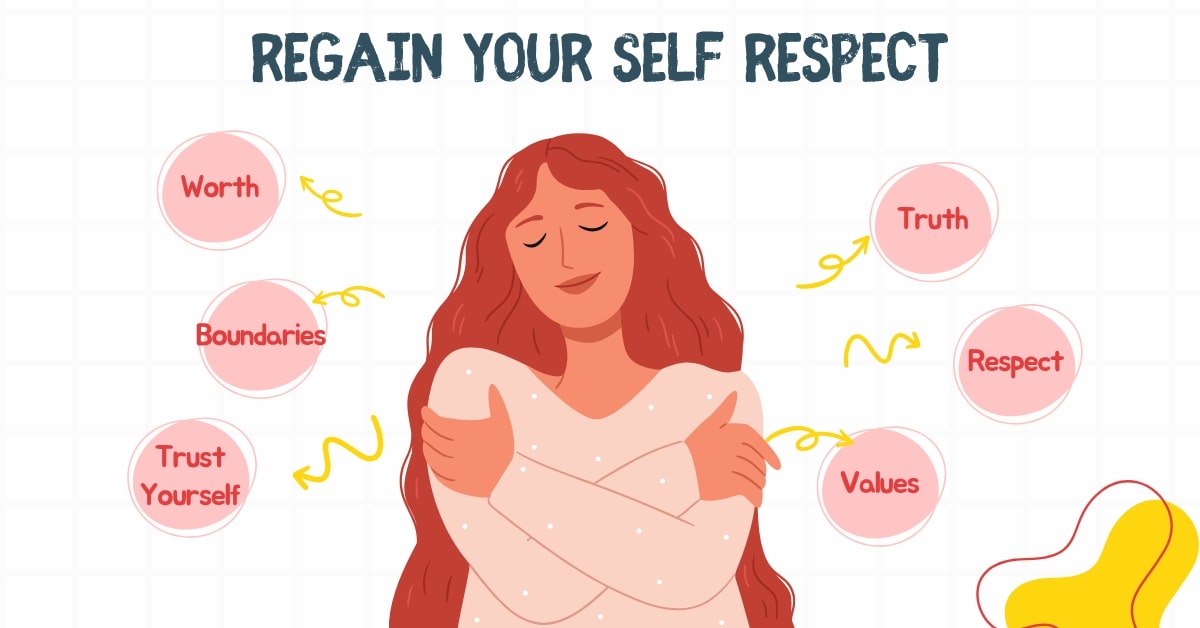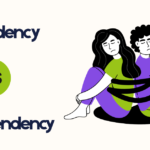The Quiet Power of Self-Respect
You’ve heard it before.
“Respect yourself.”
“Stop settling.”
“Know your worth.”
But no one ever really told you how.
They didn’t tell you how blurry it gets when love is involved.
They didn’t warn you how easy it is to slowly, quietly shrink to fit inside someone else’s comfort zone.
It doesn’t happen all at once.
It happens the day you say “it’s okay” when it’s not.
The night you apologize even though you didn’t do anything wrong.
The moment you feel like a burden just for needing something… basic.
This isn’t about being dramatic. This isn’t about being “too sensitive.”
This is about how self-respect sometimes goes missing in the name of keeping peace. And how sometimes, keeping peace with others means losing peace with yourself.
Real self-respect isn’t loud.
It’s not cutting people off or pretending not to care.
It’s quiet. It’s soft.
It’s saying, “This doesn’t feel right,” even if your voice shakes.
It’s leaving the door open for love, but not at the cost of your own reflection.
If any of this feels a little too familiar, I want you to know:
You’re not broken.
You’re not weak.
You just learned to survive in places where self-respect wasn’t welcome.
But you get to come back home to yourself now.
This space, these words they’re here for that.
Let’s begin.
What Is Self-Respect, really?
Self-respect is how you treat yourself when no one else is around to clap for it.
It’s the decisions you make when no one is watching.
It’s how you talk to yourself after you mess up.
It’s what you allow, what you walk away from, and what you no longer explain to people who keep asking you to shrink.
Contrary to what some might think, self-respect isn’t about arrogance. It’s not a sharp tongue, an eye roll, or a refusal to need anyone. It’s not being better than someone — it’s simply refusing to be less than yourself.
In the words of psychotherapist Divya Robin, self-respect is rooted in self-belonging. When you respect yourself, you operate from the belief that you deserve to exist, to take up space, and to be treated with care — not because you’ve earned it, but because you’re human. Full stop.
For example
Saying “no” to an invitation you don’t have the energy for — and not spiraling into guilt.
Choosing to step back from a conversation that feels more punishing than productive.
Not calling yourself “stupid” after making a mistake, but instead pausing, breathing, and saying, “That was hard, but I’m still learning.”
Sometimes it’s subtle. Sometimes it’s hard. Sometimes it doesn’t feel good in the moment at all.
But it’s real.
And most of the time, it’s not glamorous or dramatic — it’s just you, quietly choosing not to abandon yourself again.
Self-respect is the quiet decision to stay rooted in your dignity… even when it’s uncomfortable. Even when no one else claps for it. Especially then.
How do We Lose It?
Self-respect doesn’t usually disappear overnight. It fades gradually, in ways that are easy to miss.
It begins with small compromises that feel harmless. You apologize when you’re not at fault. You say yes even when you’re tired. You swallow your opinions to avoid conflict. You tell yourself it’s no big deal.
But over time, these patterns add up. And suddenly, you’re not sure where you went in all of it.
You find yourself shrinking. Silencing your truth to keep the peace. Avoiding honesty because you’ve learned that speaking up comes with consequences. That’s not weakness — that’s survival mode.
In psychology, this can show up as boundary erosion, where the lines between your needs and other people’s comfort begin to blur. Or emotional enmeshment, where your identity becomes tied to keeping everyone else okay.
Here’s the difficult part: many of these habits are praised. Being agreeable. Easygoing. Selfless. We grow up believing that being good means being quiet. But the truth is far more complex.
As one therapist puts it, “We’re often taught that being agreeable is virtuous — but self-erasure is not harmony.”
If you’ve recognized yourself here, don’t panic. You’re not weak. You’re not naïve. You adapted in ways that made sense for you at the time.
But now, you’re allowed to choose something new.
You’re allowed to relearn what it means to take up space in your own life.
Gently. With care. Without apology.
Self-Respect vs. Self-Esteem: Why It Matters
Let’s stop dressing this up.
Some days, you feel like you’re doing alright. You show up, hit the deadlines, make someone laugh, get a decent photo of yourself — and for a second, you think, “Okay. I’m not so bad.”
Other days?
You spiral over one small thing. You can’t focus. You forget how to speak kindly to yourself. You start picking yourself apart in silence. You question your worth because someone didn’t text back fast enough.
That’s self-esteem.
And it’s a shape-shifter.
It changes with your performance, with your moods, with how loud your inner critic decides to be that day. It’s sensitive. It’s not fake — it’s just fragile.
But self-respect…
Self-respect is different.
Self-respect is the part of you that still makes the bed when your brain says, “You don’t deserve rest.”
It’s the part that says, “Hey. You don’t have to let them talk to you like that. Not again.”
It’s what kicks in when everything else is cracked — and you still choose not to abandon yourself.
Here’s how to think about it:
Self-esteem is the weather. Self-respect is the shelter.
You might not always feel lovable. You might mess up. You might have days where everything feels off and ugly and shaky.
But even on those days — especially on those days self-respect says,
“You still get to eat. You still get to rest. You still get to say no.”
It doesn’t wait for you to feel good about yourself. It just holds you steady until you remember how to.
So, if you’re waiting to start treating yourself well until you “love yourself more,” please stop.
Start now.
Start with one small moment of not being cruel to yourself.
Respect isn’t something you earn by being perfect.
It’s something you’re allowed to have simply because you exist.
5 Psychology-Backed Benefits of Self-Respect
When you start treating yourself with respect — not performatively, but for real — things begin to shift. Quietly. Powerfully. And almost always from the inside out.
Here’s what that can look like:
1. Stronger boundaries.
You stop overexplaining why you’re tired. You stop justifying your “no.” You realize your energy doesn’t need a permission slip.
Psychologists call this boundary clarity — when your limits are no longer up for debate. You protect your peace without guilt. It’s not cruelty. It’s care.
2. Less people-pleasing.
You don’t feel that shaky urgency to be liked by everyone anymore. You can say, “I’m not up for that,” and not spiral for three hours afterward.
When self-respect strengthens, so does your nervous system. You stop managing other people’s reactions like it’s your full-time job.
3. Healthier relationships.
You stop chasing the ones who only love you in fragments. You start choosing people who don’t require you to shrink, shape-shift, or walk on emotional eggshells.
This isn’t about becoming “hard to reach.” It’s about finally being reachable to the right people.
4. Better mental health.
You start to notice your anxiety quieting. Why? Because the war inside you — between what you feel and what you allow — begins to settle.
Self-respect reduces self-abandonment, and that gives your nervous system a chance to exhale.
5. Increased self-trust.
This one sneaks up on you.
You say no… and nothing breaks.
You make a hard decision… and it turns out
How to Start Rebuilding Self-Respect
Rebuilding self-respect isn’t about flipping a switch. It’s about choosing yourself — quietly, consistently — in the places where you used to disappear. Here’s where you can start:
1. Clarify your values.
Self-respect is rooted in living close to what actually matters to you — not what you were taught should matter.
Ask yourself: What do I stand for? What do I deeply care about?
If kindness, honesty, or freedom top your list, check: Are your current habits aligned with those?
Even just writing your values down can begin the realignment. It’s like remembering your own name after answering to someone else’s for too long.
2. Practice consistent boundaries.
Not walls. Not ultimatums. Just compassionate limits.
When you say, “I can’t take calls after 10,” or “I need time to process before responding,” you’re protecting your peace — not being difficult.
Boundaries aren’t about pushing people out. They’re about staying in integrity with yourself.
3. Follow through on small promises.
Big gestures aren’t the goal here. Self-respect is built in the micro-moments.
Drink the water you said you would. Go for that 10-minute walk you keep skipping.
Each time you do, your nervous system learns: “I can count on me.”
4. Surround yourself with people who respect your ‘no’.
Pay attention to who gets angry when you choose yourself.
If someone only values you when you’re bending, that’s not love.
Seek out the ones who listen, even when your answer isn’t convenient.
5. Speak to yourself like you would a friend.
Would you call your best friend “stupid” for needing rest?
Would you shame them for feeling anxious or behind?
Then don’t do it to yourself.
Every time you offer yourself grace, you’re re-teaching your brain that you are not the enemy.
This is how it begins.
Not loud. Not perfect. Just steady.
One small act of self-loyalty at a time.
When You Slip And How to Repair?
You’re going to mess up.
You’ll say yes when your whole body means no.
You’ll break your own boundary.
You’ll ignore the gut feeling you promised to trust this time.
And your first instinct might be to shame yourself — “I knew better.”
But hear this: You’re not failing. You’re unlearning decades of conditioning.
Self-respect isn’t a perfect streak.
It’s a relationship — and like all relationships, there will be moments where you fall out of alignment. What matters is what you do next.
Instead of punishing yourself, try something different: repair.
Let’s say you agreed to plans you didn’t want — again. Instead of spiraling, pause and reflect gently:
“Why did I feel unsafe saying no in that moment?”
“What need was I trying to meet — acceptance, peace, fear of conflict?”
“What would I like to try next time?”
This is called self-trust repair — the act of turning toward yourself with curiosity instead of criticism. You’re not pretending it didn’t happen. You’re learning from it, without abandoning yourself in the process.
Because self-respect isn’t about doing it “right” every time. It’s about showing up — again and again — with more honesty, more kindness, and more alignment than you did yesterday.
Even the decision to reflect instead of shame yourself?
That’s self-respect, too.
So the next time you slip, don’t ask “What’s wrong with me?”
Ask, “What do I need to feel safe enough to choose myself next time?”
That’s where the healing lives.
And that’s where your self-respect keeps growing.
A Return, not a Reinvention
Before you click away, take one slow breath.
Now ask yourself — gently, honestly:
Where do I most often abandon my self-respect?
And where do I want to start showing up differently?
No need to solve it all today.
No need to rebuild yourself from scratch.
You’re not a project.
You’re a person — remembering.
Sometimes, it’s not that you’ve “lost” your self-respect.
It’s that you’ve been surviving. Bending. Trying to keep the peace.
So let’s start here:
With softness.
With honesty.
With one small return to yourself.
You don’t need a personality overhaul.
You just need to remember your worth — and begin again.
And if no one’s told you this in a while, let this sink in:
You don’t have to shout to be worthy.
You don’t have to explain your worth to deserve care.
You just have to believe your needs matter.
And they do. Because you do.
So go gently.
Let your self-respect grow in the small, quiet choices.
You’re not behind. You’re on your way home — to you.
A passionate psychologist on a mission to make psychology insightful, relatable, and engaging! From mental health to human behavior, I break down complex ideas into thought-provoking reads for curious minds.





















